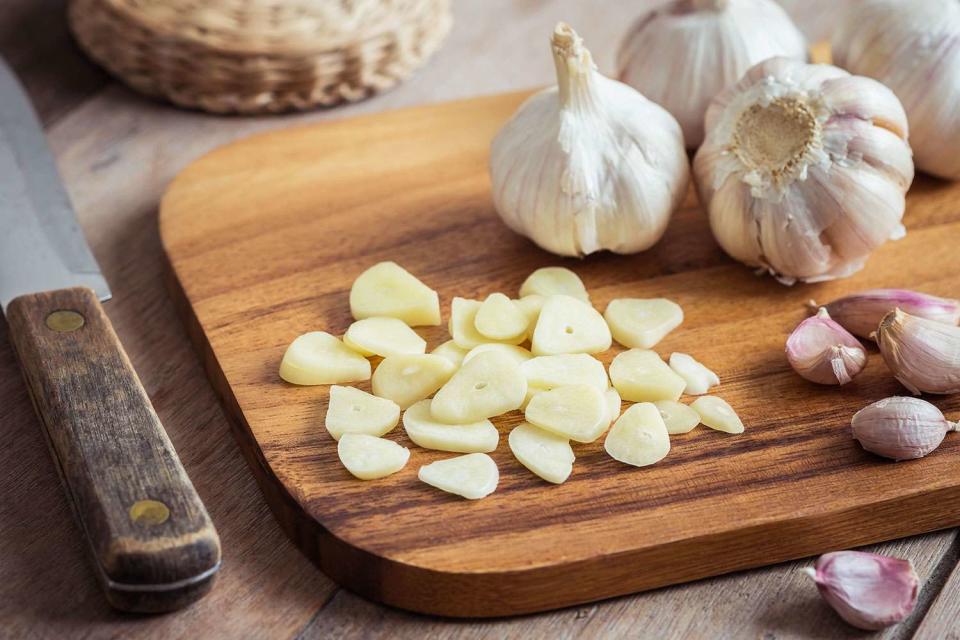5 Ways to Remove the Garlic Smell From Your Hands—Including Martha's Favorite Method
Of course, Martha's is best—but these other tips work well too.

Amarita / Getty Images
Home cooks and culinary pros alike love garlic, whether it's garlic bread, chicken cooked with 20 cloves, or a tomato tart with roasted garlic and fontina cheese. However, most people could do without that lingering garlic scent that permeates hands and fingertips. Thankfully, with these five strategies in your back pocket, you'll be able to rid your palms and digits of the pungent odor in no time.
Meet Our Expert
Albert Nguyen, chef-instructor of culinary arts at the Institute of Culinary Education
Vandana Sheth, RDN, CDCES, FAND, author of My Indian Table: Quick & Tasty Vegetarian Recipes
Michelle Doll Olson, senior culinary development manager at HelloFresh
Related: How to Crush Garlic: Learn This Easy, Essential Technique
Why Does Garlic Smell So Strongly?
Your signature stuffed eggplant or steamed artichokes with lemon-garlic aioli wouldn’t be the same without this member of the allium family, but there’s a scientific reason garlic wreaks so strongly, leaving its stamp on your breath and hands alike. "The pungent smell of garlic is produced when its cell walls are ruptured and crushed, releasing an enzyme that breaks itself down, producing sulfur compounds—which is what we recognize as that distinct smell as well as spicy taste," says Albert Nguyen, chef-instructor of culinary arts at the Institute of Culinary Education.
Tips
Nguyen recommends always using a sharp knife to slice or chop garlic, so the garlic cells are cleanly sliced instead of being crushed by a dull knife.
The way you cut your garlic can make a difference in how intense the resulting eau de garlique is. Nguyen says the finer the garlic is chopped/minced/grated, the more the cells are being ruptured and exposed to its enzymes. Accordingly, if you want to avoid that strong smell, he suggests slicing the garlic instead of mincing it. And if you really can't stand the smell of garlic on your hands, he suggests using a garlic press, even though this will result in a milder taste of garlic in the dish.
Martha's Method
Martha has a quick and easy technique for getting the garlic smell off your fingers—and it's our favorite: Under warm running water, carefully rub your fingers over a stainless steel item like the spine of a knife (the flat back edge of the knife opposite the blade) or a stainless steel bowl.
The Sink Method
This strategy is similar to Martha's method and is ideal for anyone who has a stainless steel kitchen sink (the most popular material for kitchen sinks due to its rust-resistant and easy-to-clean properties).
Wash your hands with soap and water. “This gets rid of most of the volatile compounds that make your hands smell,” says Nguyen.
Rub your fingertips somewhere around your sink while you are washing or rinsing them. This will remove the remaining sulfur compounds on your hand, says Nguyen, noting that the sulfur compounds on your finger will bind to the stainless steel on your faucet or sink.
The Steel Soap Bar Method
Another riff on Martha’s method for removing the smell of garlic from your hand, this variation calls for buying a stainless steel odor remover bar, which looks like a bar of soap but is made of stainless steel. Like the methods above, it is used under running water.
The Baking Soda Method
Using baking soda will counteract the smell of garlic on your hands thanks to its alkaline properties, says Vandana Sheth, RDN, CDCES, FAND, and author of My Indian Table: Quick & Tasty Vegetarian Recipes.
Create a paste with a few pinches of baking soda and water.
Rub the paste into your hands before washing them with soap.
The Lemon Juice Method
This is similar to the baking soda method. The acidity of lemon juice also neutralizes the garlic smell on your hands.
Sheth suggests rubbing lemon juice over your hands. Then, rinsing the juice off and washing your hands with soap.
Alternatively, Michelle Doll Olson, senior culinary development manager at meal kit company HelloFresh has found that washing a whole lemon in tepid water or rubbing a slice of lemon peel on your hands will take care of the smell and leave your hands pleasantly lemony.
Read the original article on Martha Stewart.

